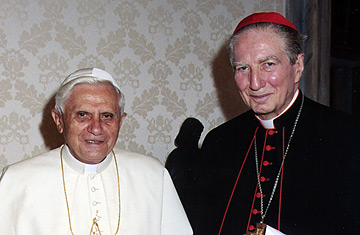
Pope Benedict XVI, left, with Italian Cardinal Carlo Maria Martini in 2005.
The Pope has confirmed the Vatican's strictly traditional party line on questions of doctrine and moral theology. But his more progressive counterpart, the former Archbishop, has hardly disappeared. Officially, having stepped down from his Milan post in 2003 after reaching the prescribed retirement age of 75, Martini should be enjoying a quiet, scholarly retirement with his biblical studies in Jerusalem. Still, most Church insiders say the Jesuit Cardinal, who turned 80 on Saturday, remains the single most influential Catholic leader challenging Rome's rigid-as-ever stances on moral issues.
In recent months, Martini has raised subtle though crucial objections to the Church's steadfast opposition to all circumstances of assisted fertility, distribution of condoms for AIDS victims and so-called "right-to-die" cases. His long cover-story interview last April with the Italian magazine L'Espresso set off an internal Church debate about whether a married AIDS patient's use of a condom is the "lesser of two evils," and a Vatican document on the issue may come out later this year.
Martini has long understood that speaking softly is the best way for a dissenting voice to be heard. Most recently, in an interview published Sunday in the Rome-based daily La Repubblica, he politely challenged both Benedict and Cardinal Camillo Ruini, head of Italy's bishop conference, for their repeatedly strong condemnations of an Italian government proposal to legalize civil unions for homosexuals and heterosexuals who don't want to marry. Though no supporter of gay marriage, Martini nevertheless decided it was time to register his opposition to the Vatican's hammering away on family-related issues. "The family is the cell of society, and is therefore very important," he said. "Certainly the family should be defended and promoted. But the promoting, I think, is more important than defending." He went on to warn against the "confrontation among the various positions that create tensions and useless and dangerous clashes." In the past, he has voiced his support for woman deacons, and even called for a Third Vatican Council to address the many issues dividing Catholics. Martini has long been a beacon for a generation of progressive bishops and cardinals, like Archbishop of Westminster Cormac Murphy-O'Connor, who has recently pushed to have a mass for gay parishioners. Martini and his followers, in fact, have long contrasted with the future German pope.
Both born in 1927, Martini and Ratzinger were already acclaimed Catholic scholars when Pope John Paul II promoted them to two of the top spots in the Church hierarchy: Martini to Milan in 1979 as Archbishop of Europe's largest diocese, and Ratzinger to Rome in 1981 as head of the Vatican's doctrinal office. Over the years, the two soft-spoken Cardinals became seen as intellectual and institutional titans, practically alter egos, and the undeclared leaders of opposing theological camps battling for the soul of the Church. Like Ratzinger's backers, Martini fans once hoped their man might succeed John Paul. Still today, as when they were Cardinal colleagues, most note a mutual Ratzinger-Martini respect, based largely on their shared scholarly heft. In fact, most believe that Martini — who received a sizeable number of votes in the early conclave balloting in 2005 — ultimately urged his progressive allies to support Ratzinger.
Father Keith Pecklers, a Rome-based Jesuit professor of liturgy, says the gray-haired Cardinal continues to embody the religious order's approach. "Martini exhibits the best Jesuit qualities of unwavering loyalty to the church, and courageous leadership in reading the signs of the times and addressing contemporary issues with credibility," says Pecklers. "Most bishops retire into the shade. But Martini is as present as ever, and still a real prophetic voice within the Church hierarchy." His active role is even more notable in light of Martini's suffering — as John Paul did — from Parkinson's disease.
For Church traditionalists, Martini remains a bete noire of liberal leadership. One conservative website described his recent remarks about an Italian euthanasia case as "another subversive blow." L'Espresso's veteran Vatican correspondent Sandro Magister, a supporter of the Pope's clear doctrinal lines, acknowledged Martini's continued weight. His dissent on moral issues, Magister wrote, "pits the highest leaders of the worldwide Church against each other with conflicting positions."
Having now turned 80, Martini is no longer eligible to vote in future conclaves. As for the now-Pope Benedict, his 80th birthday arrives in April. For the occasion, one wonders whether the pontiff would prefer from Martini another lively intellectual debate, or perhaps a permanent return to his bible studies in Jerusalem.
